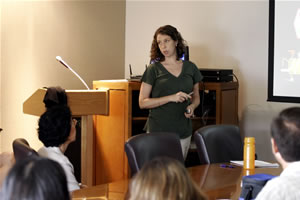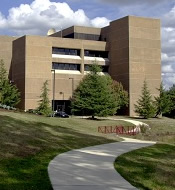
Environmental Factor, August 2007, National Institute of Environmental Health Sciences
Molecular Biologist Explores "Poised Polymerase" Phenomenon
By Eddy Ball
September 2007

On August 7, a standing-room-only audience filled the NIEHS Executive Conference Room for the monthly meeting of the Receptor Mechanism Discussion Group. The featured speaker was Karen Adelman, Ph.D., who gave a talk titled "Poised Polymerases: Sitting in the Starting Gates and Ready to Respond." Adelman’s talk was hosted by Ken Korach, Ph.D., senior research biologist in the NIEHS Laboratory of Reproductive and Developmental Toxicology.
Adelman is a tenure-track investigator and head of the Transcriptional Responses to the Environment Group in the NIEHS Laboratory of Molecular Carcinogenesis (LMC). She is also the recipient of the 2006 NIEHS Early Career Award.
Adelman’s research interests focus on the dynamic interplay between signals from the extracellular environment and transcription by RNA polymerase II [Pol II] in the minutes following an environmental stimulus. Pol II is the key enzyme responsible for transcription of protein-coding genes. Adelman’s work has indicated that common mechanisms are involved in an organism’s physiological response to many diverse stressors, such as heat shock, ultraviolet radiation, oxidative stress, toxins and carcinogens. By studying the way healthy cells deal with stress, Adelman hopes to discover what goes wrong with transcription profiles in disease states and after repeated environmental exposures.
Her investigations grew out of observations that Pol II in Drosophila behaved in manner counter to accepted theories about gene transcription. Rather than transcribing Hsp70 heat shock genes immediately upon recruitment to the promoter, Pol II can begin transcription, but then become "stuck" near the promoter for up to ten minutes in a state called "proximal-promoter stalling." This stalled state precedes the transitions needed to allow the polymerase to function as a stable and productive elongation complex capable of penetrating chromatin barriers.
Conventional theory equated Pol II recruitment to a gene promoter, when it arrives at the "starting gates," with gene activation. "It had become dogma in the field," Adelman explained, "that if there was no polymerase brought to the promoter, the gene was off, and as soon as polymerase was brought to the promoter, the gene was on."
Using chromatin immuno-precipitation (ChIP) assays, Adelman’s group set about trying to determine what other proteins were associated with Pol II at the stall site and might be responsible for proximal-promoter stalling. The most likely candidate, they found, was a protein complex known as negative elongation factor (NELF), which quickly disassociated from the Pol II when the transcriptionally stalled polymerase was released into the gene.
Performing array-based ChIP-chip (chromatin immuno-precipitation on a chip) studies, her genome-wide research turned up 1,000 other genes with stalled Pol II that are exceptions to that paradigm, suggesting that proximal stalling is far more widespread than previously suspected. In addition, Adelman "started to see a trend that the genes which are regulated by stalling were inducible by environmental or developmental stimuli," indicating that Pol II stalling may allow these genes to be "poised" for rapid regulation of gene expression
Adelman’s lab is trying to understand those gene-environment interactions and the epigenetic changes that can generate altered patterns of gene expression. Among the handful of mammalian genes that have been shown to exhibit proximal-promoter stalling are the proto-oncogenes c-Myc and c-FOS, several genes regulated by estrogen receptor-alpha (ER-α) and the human immunodeficiency virus (HIV). "By studying this stalling process in Drosophila genes, we hope to get insight into some very important genes," she said.
According to Adelman, there is no shortage of rapid response genes in humans, and humans have a conserved form of the NELF complex, which includes the protein known as cofactor of BRCA1 (COBRA1). The group’s goal is to continue investigating the role of Pol II stalling in the regulation of inducible genes, and to characterize the mechanisms of activity of a number of factors that function in both cellular survival pathways and the development of cancer.
"Committee Proposes..." - previous story ![]()
![]() next story - "Duke Physician..."
next story - "Duke Physician..."
September 2007 Cover Page



